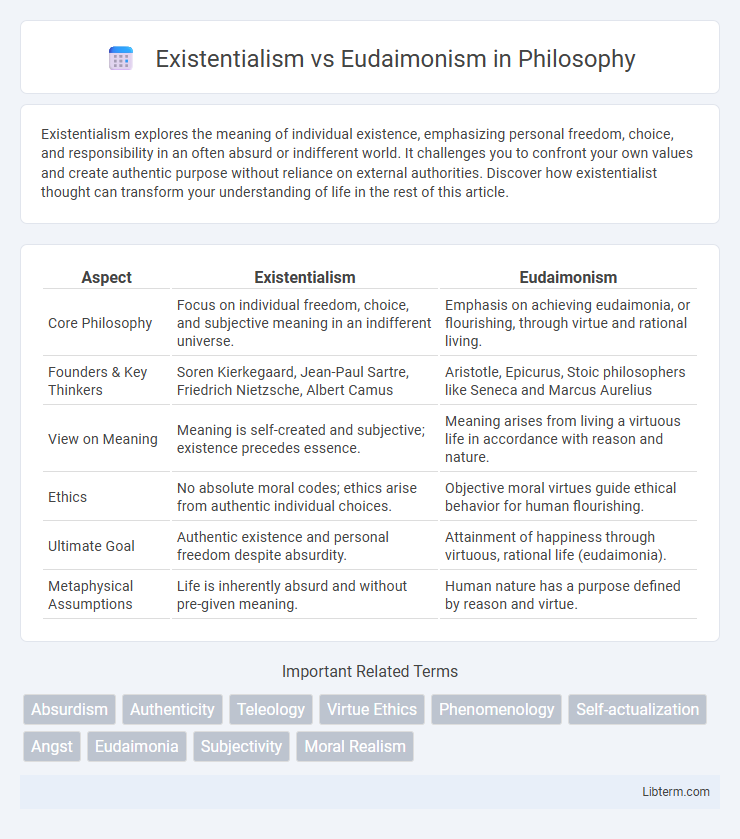Existentialism explores the meaning of individual existence, emphasizing personal freedom, choice, and responsibility in an often absurd or indifferent world. It challenges you to confront your own values and create authentic purpose without reliance on external authorities. Discover how existentialist thought can transform your understanding of life in the rest of this article.
Table of Comparison
| Aspect | Existentialism | Eudaimonism |
|---|---|---|
| Core Philosophy | Focus on individual freedom, choice, and subjective meaning in an indifferent universe. | Emphasis on achieving eudaimonia, or flourishing, through virtue and rational living. |
| Founders & Key Thinkers | Soren Kierkegaard, Jean-Paul Sartre, Friedrich Nietzsche, Albert Camus | Aristotle, Epicurus, Stoic philosophers like Seneca and Marcus Aurelius |
| View on Meaning | Meaning is self-created and subjective; existence precedes essence. | Meaning arises from living a virtuous life in accordance with reason and nature. |
| Ethics | No absolute moral codes; ethics arise from authentic individual choices. | Objective moral virtues guide ethical behavior for human flourishing. |
| Ultimate Goal | Authentic existence and personal freedom despite absurdity. | Attainment of happiness through virtuous, rational life (eudaimonia). |
| Metaphysical Assumptions | Life is inherently absurd and without pre-given meaning. | Human nature has a purpose defined by reason and virtue. |
Understanding Existentialism: Core Principles
Existentialism centers on individual freedom, choice, and the inherent meaninglessness of life, emphasizing personal responsibility in creating one's own purpose. Core principles include authenticity, the angst of existence, and the rejection of predetermined essence, highlighting human beings as creators of their own values. This philosophical approach contrasts with eudaimonism by focusing on subjective experience rather than objective flourishing or virtue.
Eudaimonism Explained: Foundations and Philosophy
Eudaimonism, rooted in Aristotelian ethics, centers on achieving eudaimonia, often translated as flourishing or well-being, through the cultivation of virtue and rationality. This philosophy emphasizes living in accordance with one's true nature and fulfilling one's potential by developing moral character and practical wisdom. The foundation of eudaimonism lies in the pursuit of a balanced and meaningful life, where happiness results from virtuous activity rather than transient pleasures.
Key Differences Between Existentialism and Eudaimonism
Existentialism emphasizes individual freedom, choice, and the creation of meaning in an inherently meaningless world, focusing on personal authenticity and existential angst. Eudaimonism centers on achieving eudaimonia, or human flourishing, through virtuous living and fulfillment of one's potential based on moral and rational principles. While existentialism prioritizes subjective experience and individual existence, eudaimonism stresses objective well-being and ethical development as the path to the good life.
The Role of Authenticity in Existentialism
Existentialism emphasizes authenticity as a fundamental principle, urging individuals to create their own meaning through genuine choices and self-awareness, rejecting external impositions and societal pressures. This pursuit of authenticity contrasts with Eudaimonism's focus on achieving flourishing or well-being through virtuous living aligned with an inherent human nature. Authenticity in existentialism prioritizes personal freedom and responsibility, highlighting the continuous process of self-definition in an absurd or indifferent universe.
Virtue and the Good Life in Eudaimonism
Eudaimonism centers on achieving the Good Life through the cultivation of virtues such as courage, wisdom, and justice, which align with human flourishing and intrinsic happiness. Unlike Existentialism's emphasis on individual freedom and subjective meaning, Eudaimonism promotes objective moral values rooted in Aristotle's ethical framework. This perspective asserts that living virtuously is essential for fulfilling one's potential and attaining true well-being.
Freedom and Responsibility: Existential Perspectives
Existentialism emphasizes radical freedom where individuals create their own meaning through choices, bearing full responsibility for their actions without external justification. This philosophy asserts that freedom is intertwined with angst and the burden of authentic self-determination in an inherently meaningless world. In contrast, eudaimonism highlights flourishing through virtuous living within nature's order, focusing less on absolute freedom and more on aligning individual purpose with ethical responsibility.
Happiness and Fulfillment: Eudaimonic Approaches
Eudaimonism emphasizes happiness through living a virtuous life aligned with one's true self, promoting fulfillment derived from personal growth, purpose, and ethical behavior. Unlike existentialism's focus on individual freedom and creating meaning amidst absurdity, eudaimonic approaches prioritize flourishing by actualizing human potential and embracing moral virtues. Research in positive psychology supports eudaimonic well-being as a pathway to enduring happiness and life satisfaction beyond fleeting pleasures.
Prominent Existentialist Thinkers and Ideas
Prominent existentialist thinkers such as Soren Kierkegaard, Jean-Paul Sartre, and Simone de Beauvoir emphasize individual freedom, authentic existence, and the confrontation with absurdity or angst. Kierkegaard introduced the concept of "subjective truth" and the leap of faith, while Sartre developed the idea of radical freedom and responsibility through his notion that "existence precedes essence." Simone de Beauvoir expanded existentialism to feminist thought, exploring how freedom and oppression intersect in the construction of identity.
Influential Eudaimonist Philosophers and Theories
Aristotle remains a central figure in eudaimonism, advocating for eudaimonia as the highest human good achieved through virtue and rational activity. Modern eudaimonist philosophers like Martha Nussbaum emphasize capabilities and human flourishing, expanding Aristotle's framework to contemporary ethics and social justice. Their theories highlight the importance of fulfilling one's potential and living in accordance with reason to achieve a meaningful and flourishing life.
Bridging the Gap: Integrating Existentialism and Eudaimonism
Integrating existentialism and eudaimonism involves reconciling existentialism's emphasis on individual freedom, authenticity, and confronting absurdity with eudaimonism's focus on flourishing through moral virtue and rational self-realization. This synthesis proposes that authentic choices grounded in personal meaning can guide individuals toward eudaimonic well-being, fostering a life characterized by purposeful fulfillment rather than mere hedonic pleasure. By embracing existential freedom within the framework of eudaimonic virtues, individuals can achieve a balanced life that honors both subjective authenticity and objective flourishing.
Existentialism Infographic

 libterm.com
libterm.com